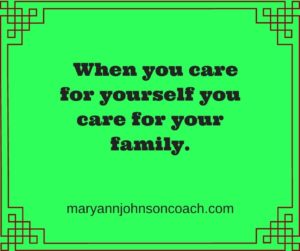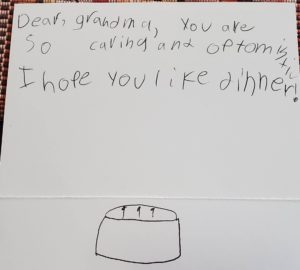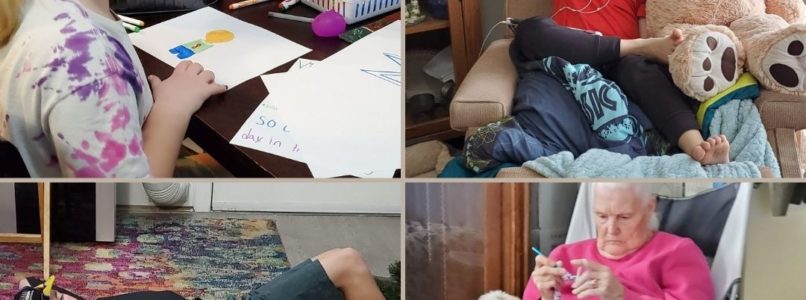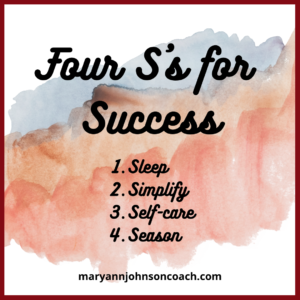 I have a friend who was also my daughter’s friend in high school. We have known each other for a long time! We talk about stuff – family, running our homes better, being kind, writing, you know, stuff.
I have a friend who was also my daughter’s friend in high school. We have known each other for a long time! We talk about stuff – family, running our homes better, being kind, writing, you know, stuff.
Bethany said that she couldn’t understand how you wouldn’t have time for yourself when she was a teen. She couldn’t see the problem. I mean, she had lots of time to do what she wanted to do – take a bath, sit in the sun, read, etc. Even with school and a job, there was time.
Now she has two small children, and she gets it. It makes me laugh because I always say, “You can’t know till you get there!”
One of the tricks I learned decades ago was to turn the bathroom into a refuge. I wasn’t going to get a day or even an hour, but I could read a paragraph or two. Bethany told me that when she read that in my book, she laughed because as a teen, she thought having books and magazines in the bathroom and reading in there was gross! Guess what? The last time we talked, Bethany said that reading in the bathroom is like a resort. You can’t know till you get there. LOL
Another thing I do and have done since I was 15 is lotion my feet every night. It felt good back then, in a home with eight other kids, to sit on my bed, in the quiet darkness and lotion my feet. I suggested it to Bethany, and she reported that it is lovely. She likes how nurturing it feels, and she likes the few moments of quiet aloneness.
A lot has been written about self-care. Recently I saw a headline – Self Care is More than Reading in the Bathroom. I laughed. Reading in the bathroom has been part of my self-care for fifty years. It works. I hope you get away occasionally. I hope you go out to lunch with friends. I hope you take a day off now and then. But I also hope you learn to care for yourself right where you are – in the middle of your busy family.
Four Reasons to care for yourself in the thick of things
There are some stellar reasons to find ways to care for yourself right where you stand, amid family:
• You can remain calmer for more extended periods.
• It facilitates patience and helps us not take our frustration out on our kids.
• It allows us to stay free of resentment, exhaustion or feeling depleted.
• It keeps us healthier.
Self-care benefits not only us but also our whole family. It’s an investment in our family relationships rather than a selfish indulgence.
Here are four ways to care for yourself during your busy, child-filled days and nights. They aren’t new. You have probably heard them said many times. But they work. As you implement them, you will feel better and less stressed. I consider them the best kind of ongoing self-care:
1—TALK NICELY TO YOURSELF
You need to be your own best friend, no matter how you’re doing presently. Best friends speak kindly to each other, are honest, and support one another, even if one of them is floundering. It’s self-care when you treat yourself like your own best friend.
2—SLEEP
Sleep is one of my favorite subjects. I’ve had tons of experience with this one thing! Periodically, over 30 years, I would go in prayer and ask how I could better handle my life. I would always have the same thought, “Go to bed earlier and get up earlier.” And just as regularly, I would dismiss the whole idea. I didn’t want to follow that counsel. I wanted my house in order, and I wanted alone time. I was convinced the only way to get either one was to stay up late. So, I resisted. Years passed, and I got desperate. I asked a final time, but the impression was the same. “Go to bed earlier and get up earlier.” But this time, I didn’t resist.
Going to bed earlier and getting up earlier is doable! It’s possible even if your kids get up at 5:30. You get up when they do and it is early! You probably won’t have a quiet morning routine alone. These are the hard facts. What will make this trade-off worthwhile is how you’ll feel during the day. You may not get much more alone time, but you’ll find it easier to be with your kids. You’ll find yourself feeling happy more often. You will have more energy and lose your temper less. You’ll like yourself and your children better.
I recommend you begin going to bed at least 30 minutes earlier than you do now, an hour if you can commit to it. Don’t get on the computer or phone after 10 pm. Staying tech-free an hour before bed will absolutely help you get to bed earlier! Some days it just won’t work out but do it as often as you can. Going to bed earlier will change your days! It won’t be easy to make this shift, but if you remember that simple things, consistently done over time, make significant differences, you’ll be able to persevere as long as it takes to make this your new habit.
3—EAT WELL
Can I say, stop eating over the sink! Stop calling the crusts of your children’s sandwiches lunch. Stop. Make a better choice. Fix your food and sit down with your kids and eat. Have a mini conversation. Laugh a bit. Savor that sandwich. It takes five minutes! Value yourself enough to sit down with a plate and eat even if it is with kids and only for five minutes.
If you work away from home, take a lunch. This was a hard lesson for me to learn, but if I can learn it, you can learn it. It’s a decision, and I’ve made it, to care for myself by eating well.
Don’t eat at your computer, either at home or at the office. I know you’re busy, but if you want to feel cared for, leave your desk. Turn on music as you eat. Sit outside if the day is warm. Even the break room and a coworker trump your desk.
Eating well should be at the top of your self-care list. It’s something you can do while in the thick of parenting. Taking time to eat is one way you maintain the energy to do the job you’ve taken on—the job of raising a family.
.
4—EXERCISE
Oh man, I don’t like to exercise. I can’t think of any exercise I like except swimming. But that requires a drive in the car and wet hair. Ick! Frankly, I also believed I didn’t have the time. But as I’ve said, when we take full responsibility for our lives, we stop using the time excuse.
I know half a dozen women who walk their kids to school daily. They’re in a big group talking, laughing, and making it work. I can think of another three women who get up early and walk together. They’ve made deals with their husbands to get kids fed so they can have this half-hour before they need to send them out the door to school. They walk five days a week. I recall one mom who did her exercising in front of the TV with a child on her back. You do whatever it takes. : )
None of this is easy. You just need to decide to do it. It’s a choice that, when made, feels nurturing. Talk to your spouse. What can you do? How can you make it work? Now do it.
Daily Self-Care
You’re going to spend far more time with your children than you’re going to spend without them, so it’s imperative to learn how to self-care while you’re in the thick of parenting. It’s simple, it’s doable, and it takes small amounts of time and virtually no money; but it can and will pay huge dividends.
Self-care can be as plain and straightforward as having a cup of herbal tea while you read to your children. It might be taking a few deep breaths while soothing a screaming child. You could turn on your favorite music and dance in the living room with your kids. Add laughter!
Self-care can be taking a walk with your children to take the edge off the day. Sitting in the swing and watching your children play can give you fresh air and a breather from all that you’re feeling pressed to do. Go to the bathroom more often if that’s what will buy you a few moments alone. When you’re on the edge of losing your temper, getting irritable, or feeling resentful, ask yourself what you need to stay in control. Pay attention to yourself.
One of my oldest friends had licorice drops hidden in a drawer. When she needed a break, she would sneak to her room, grab a licorice drop, and then head back into the fray with a smile on her face. Hey, you do whatever it takes. : )
Do something that will feel nurturing to you. Give yourself space to get it together. When you pay attention to how you’re feeling, to what’s happening in your body, that’s self-care. You can do this while you’re in the thick of parenting.

 My alma mater has a Facebook page. Recently someone asked this question: What life hacks are helping you kill it right now. For me, at this busy stage of life, as a full-time caretaker, I find that a
My alma mater has a Facebook page. Recently someone asked this question: What life hacks are helping you kill it right now. For me, at this busy stage of life, as a full-time caretaker, I find that a 
 Recently I was at a funeral and an old friend from my high school days was there. We haven’t seen each other for many years, but she reads what I post on Facebook.
Recently I was at a funeral and an old friend from my high school days was there. We haven’t seen each other for many years, but she reads what I post on Facebook.


 Recently, I had an interesting conversation with a friend and mentee. We were talking about some concepts found in my book, Becoming a Present Parent. She said, “The problem with your book is it’s so simple. I loved it when I read it, and it was all so doable. Then two months later, in an overwhelmed moment, I asked myself, ‘Can it really be this simple.'”
Recently, I had an interesting conversation with a friend and mentee. We were talking about some concepts found in my book, Becoming a Present Parent. She said, “The problem with your book is it’s so simple. I loved it when I read it, and it was all so doable. Then two months later, in an overwhelmed moment, I asked myself, ‘Can it really be this simple.'”
 Gratitude is a choice not based on what is happening to us, what we have or don’t have, but on how we choose to see what is happening to us. Regardless of our circumstances, we all have much to be grateful for if we pause and contemplate our blessings.
Gratitude is a choice not based on what is happening to us, what we have or don’t have, but on how we choose to see what is happening to us. Regardless of our circumstances, we all have much to be grateful for if we pause and contemplate our blessings. Some years ago, I decided to find out what I could do to improve my life the most.
Some years ago, I decided to find out what I could do to improve my life the most. 
 Sometimes I think back
Sometimes I think back 
 I gave up New Year’s Resolutions many years ago. I always felt set up for failure. I have found it more useful to periodically evaluate how I am managing my life, how I am feeling about it, and what simple adjustments I could make so that I fare better. I emphasize the word simple. I also keep the list short! I want success and not overwhelm.
I gave up New Year’s Resolutions many years ago. I always felt set up for failure. I have found it more useful to periodically evaluate how I am managing my life, how I am feeling about it, and what simple adjustments I could make so that I fare better. I emphasize the word simple. I also keep the list short! I want success and not overwhelm. one on Dec. 30. This Christmas, both sets of parents pondered what to
one on Dec. 30. This Christmas, both sets of parents pondered what to  do about their Christmas trees. They have older children. They like their homes to look festive. In the end, they adjusted for the season they are in. One kept all the ornaments on the top half of the tree. The other had a very small tree on a tabletop. It isn’t what they love or do every year, but it is what they did this year. Your season matters and when you honor the season you find yourself in, things feel more peaceful. They could have spent the whole season spanking baby hands or grieving over broken family mementos. But they choose to respect the season their family was in.
do about their Christmas trees. They have older children. They like their homes to look festive. In the end, they adjusted for the season they are in. One kept all the ornaments on the top half of the tree. The other had a very small tree on a tabletop. It isn’t what they love or do every year, but it is what they did this year. Your season matters and when you honor the season you find yourself in, things feel more peaceful. They could have spent the whole season spanking baby hands or grieving over broken family mementos. But they choose to respect the season their family was in.
 I have a friend, Audrey Rindlisbacher, and recently I was listening to an early morning Facebook Live she did. The topic was ‘comparison.’ Audrey is an exceptional woman who has been speaking and teaching for years on great books. I have sat with rapt attention in her classes. She inspires me with her knowledge of natural law and principles.
I have a friend, Audrey Rindlisbacher, and recently I was listening to an early morning Facebook Live she did. The topic was ‘comparison.’ Audrey is an exceptional woman who has been speaking and teaching for years on great books. I have sat with rapt attention in her classes. She inspires me with her knowledge of natural law and principles.